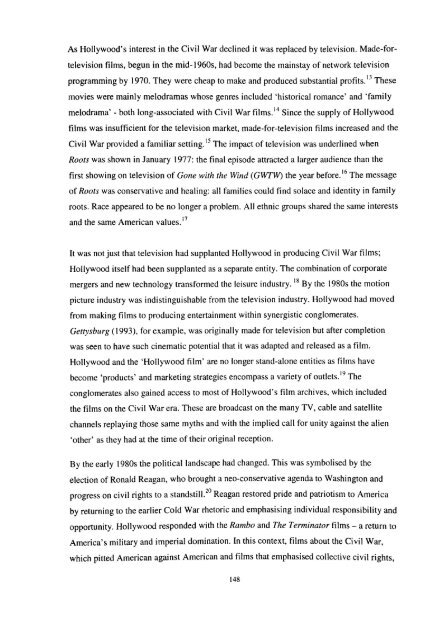Download (3483kB) - Greenwich Academic Literature Archive ...
Download (3483kB) - Greenwich Academic Literature Archive ...
Download (3483kB) - Greenwich Academic Literature Archive ...
- No tags were found...
You also want an ePaper? Increase the reach of your titles
YUMPU automatically turns print PDFs into web optimized ePapers that Google loves.
As Hollywood's interest in the Civil War declined it was replaced by television. Made-for-television films, begun in the mid-1960s, had become the mainstay of network televisionprogramming by 1970. They were cheap to make and produced substantial profits. 13 Thesemovies were mainly melodramas whose genres included 'historical romance' and 'familymelodrama' - both long-associated with Civil War films. 14 Since the supply of Hollywoodfilms was insufficient for the television market, made-for-television films increased and theCivil War provided a familiar setting. 15 The impact of television was underlined whenRoots was shown in January 1977: the final episode attracted a larger audience than thefirst showing on television of Gone with the Wind (GWTW) the year before. 16 The messageof Roots was conservative and healing: all families could find solace and identity in familyroots. Race appeared to be no longer a problem. All ethnic groups shared the same interestsand the same American values. 17It was not just that television had supplanted Hollywood in producing Civil War films;Hollywood itself had been supplanted as a separate entity. The combination of corporatemergers and new technology transformed the leisure industry. 18 By the 1980s the motionpicture industry was indistinguishable from the television industry. Hollywood had movedfrom making films to producing entertainment within synergistic conglomerates.Gettysburg (1993), for example, was originally made for television but after completionwas seen to have such cinematic potential that it was adapted and released as a film.Hollywood and the 'Hollywood film' are no longer stand-alone entities as films havebecome 'products' and marketing strategies encompass a variety of outlets. 19 Theconglomerates also gained access to most of Hollywood's film archives, which includedthe films on the Civil War era. These are broadcast on the many TV, cable and satellitechannels replaying those same myths and with the implied call for unity against the alien'other' as they had at the time of their original reception.By the early 1980s the political landscape had changed. This was symbolised by theelection of Ronald Reagan, who brought a neo-conservative agenda to Washington andprogress on civil rights to a standstill. Reagan restored pride and patriotism to America70by returning to the earlier Cold War rhetoric and emphasising individual responsibility andopportunity. Hollywood responded with the Rambo and The Terminator films - a return toAmerica's military and imperial domination. In this context, films about the Civil War,which pitted American against American and films that emphasised collective civil rights,148
















